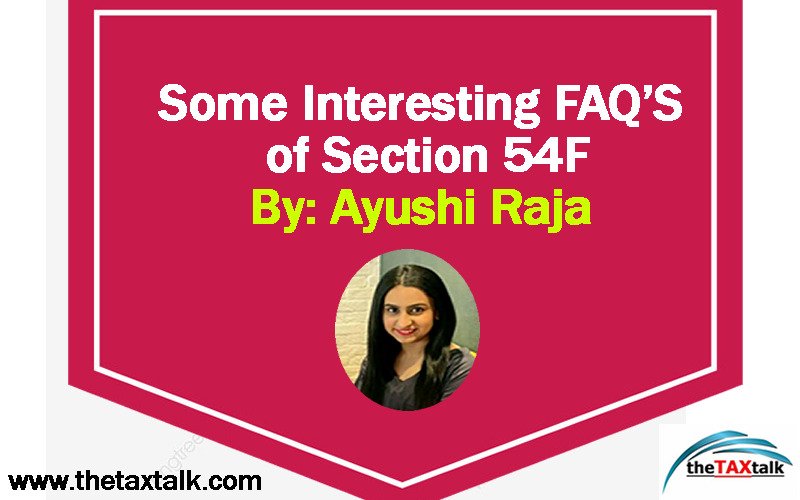![]()
Some Interesting FAQ’S of Section 54F By: Ayushi Raja
(The author is an Article Assistant at SSRPN & CO. Nagpur. She can be approached at cassrpn@gmail.com)
Some of the frequently asked questions which often leads to confusion are discussed hereby:
-
Can the assessee purchase two or more residential House Property out of the Sale Consideration?
For example, the net consideration being Rs. 50 Lakhs, out of which Rs. 20 Lakhs have been invested in purchase of one House Property, and the remaining 30 Lakhs have been invested in the purchase of another House Property. Can the assesse claim Exemption under Section 54F if he invests the Net Consideration in parts?
Solution: As per the provisions of Section 54F, only a single house can be purchased or constructed. One cannot use the money in parts to buy different real estate properties/ house properties. Thus, in the given case re-investment amounting to Rs. 20 Lakhs shall only be eligible for capital gain exemption under Section 54F.
-
X owns two residential House Properties at Nagpur. Assuming that he wishes to sell one House Property out of the two, and decides to reinvest the Net consideration in purchase or construction of a new house property. Is Mr. X eligible for deduction under Section 54F?
Solution: As per the provisions of Section 54F, at the time of sale of capital asset, the individual should not own more than one house property in his/her name. If the individual has ownership of more than one house property, the exemption gets withdrawn. Hence, in the given case, Mr. X shall not be able to avail any exemtion under Section 54F.
-
Y a resident of India, owns one residential House Property at Chicago. Assuming that he sells the House Property , and decides to reinvest the Net consideration in purchase or construction of a new house property at Chicago. Is Mr. Y eligible for deduction under Section 54F?
Solution: As per the provisions of Section 54F, inividuals cannot avail exemption under Section 54F, if they buy property outside India. In the given case, although Mr. Y is a resident of India, but the exemption gets withdrawn as he purchases the property outside India.
-
B a resident of India, owns one residential House Property at Chicago. Assuming that he sells the House Property , and decides to reinvest the Net consideration in purchase or construction of a new house property in India. Is Mr. B eligible for deduction under Section 54F?
Solution: As per the provisions of Section 54F,inividuals cannot avail exemption under Section 54F, if they buy property outside India. But, in the given case, Mr. B purchses house property in India. Although, the property is sold outside India, but because the investment is made in India, exemption under Section 54F shall be available.
-
A who is a dealer in real estate properties, sells one of the House Properties out of his new construction meant for sale. He now invests the Net Sale Consideation in purchase of another House Property to claim exemption under Section 54F. Is he eligible to claim exemtion under section 54F?
Solution: As per the provisions of Section 54F, the assessee can claim exemption under Section 54F in case of transfer of Long Term Capita Asset. In the given case, Mr. A is dealer in real estate properties, which means that the sold property is not a capital asset. Mr. A is engaged in the business of real estate properties, thus the properties shall be treated as stock in trade. Also, no exemption under Section 54F is be allowed in respect of stock in trade. So, Mr. A shall not be able to claim exemption under Section 54F.
-
XYZ & Associates a registered Partnership Firm sells a House Property registered in its name. In order to avail exemption under Section 54F, it reinvests the amount in purchase of other Residential House Property. Can XYZ & Associates claim exemption under section 54F?


